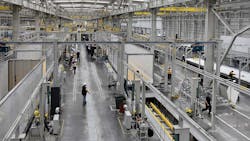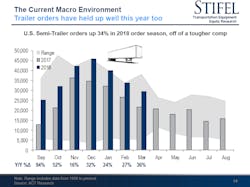'Too much of a good thing?' Trailer makers must learn to manage prosperity, analyst says
BERNALILLO, NM. Times are good, very good, for the trucking industry and transportation equipment manufacturers, members of the Truck Trailer Manufacturers Association were told in an economic update at the TTMA Annual Convention here. Business is so good, in fact, that the real challenge for manufacturers in the next year or two is going to be managing that prosperity, especially when it comes to rising material and labor costs, explained analyst Michael Baudendistel, vice president, Equity Research, with the Stifel transportation group.
Stifel estimates trailer production will come in at 305,000 units this year (up 5%) and taper off to 290,000 in 2019. Those numbers are slightly lower than the estimates by ACT Research (320,000 for 2018; 298,200 for 2019), and Baudendistel cited capacity constraints as the basis for his lower forecast.
Currently, trailer orders are up 34% in the 2018 order season (and that’s compared to a very high level last year).
In his presentation, Baudendistel outlined the challenges facing transportation equipment—which he dubbed “the questions of the hour”:
2018 – is that it, the last great year? While, from the stock market’s perspective, “good news equals bad news”—meaning investors are worried that the transportation equipment market is so hot currently, it has nowhere to go but down—in reality, there are plenty of reasons to believe that 2019 will be strong also. These include continued growth in freight volume as the economy gains steam; freight rates continue to rise, and truckload carrier profits are surging; and equipment replacement demand should be strong.
Capacity constraints – recent orders too much of a good thing? Orders through February put industry semi-trailer backlog through the end of September, Baudendistel noted, with dry vans and reefers have a longer lead time, stretching into the 4Q, while most vocational or specialty trailers have a 3-6 month lead time.
“Is this just too much for the industry to handle? I say no, but you do have to have plans in place for labor and suppliers—both of those things are getting much more difficult,” Baudendistel said. He noted that in the newest quarterly financial report from Wabco, a major global supplier, the company reported running 21 shifts per week in some facilities, with input costs rising. “This is great to have so much demand, but it also comes with some challenges.”
Where will the labor come from? “Your guess is as good as ours,” Baudendistel said. “A lot of companies have this issue—it’s not just truck drivers. It’s been very acute on the manufacturing side. Wabash [National] is talking about having difficulty with turnover rates and backfilling that attrition.”
More broadly, U.S. unemployment is down to around 4%, or “full employment,” and manufacturers face competition for labor from the construction and energy sectors. As a result, many companies have raised pay for “the first time in a long time.”
Will input costs pressure margins? “Yes, but you have to mitigate some of the exposure,” Baudendistel said. Again, he pointed to Wabash (a publicly traded trailer manufacturer, so its earnings are reported) and its hedging strategy that covers about 70% of its input costs.
The Trump administration’s tariff plan for steel and aluminum imports is also a concern. “It’s really incumbent upon the manufacturers to pass those costs along,” he said.
Will regulations upend the industry? Baudendistel noted the capacity-limiting impact of the new electronic logging mandate for truck drivers, along with improved drug and alcohol test reporting could both significant have impacts. For trailers specifically, the GHG regulation remains in limbo.
Is nothing safe from Amazon? “Nothing is Amazon-proof,” Baudendistel said.
About the Author
Kevin Jones
Editor
Kevin has served as editor-in-chief of Trailer/Body Builders magazine since 2017—just the third editor in the magazine’s 60 years. He is also editorial director for Endeavor Business Media’s Commercial Vehicle group, which includes FleetOwner, Bulk Transporter, Refrigerated Transporter, American Trucker, and Fleet Maintenance magazines and websites.
Working from Beaufort, S.C., Kevin has covered trucking and manufacturing for nearly 20 years. His writing and commentary about the trucking industry and, previously, business and government, has been recognized with numerous state, regional, and national journalism awards.


